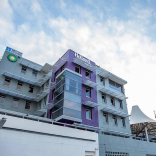MozParks hosts Minister of Economy on his official visit to Beluluane Industrial Park
Mozambique: Tax reform needed to stop ‘stranglehold’ on economy – businesses | Watch

Photo: AIM
The president of Mozambique’s Confederation of Economic Associations (CTA), Álvaro Massingue, said on Wednesday that tax reform is a priority, given the tax regime that is causing a “stranglehold” on the Mozambican economy and companies.
“Our tax system is heavy, complex and out of step with the reality of an economy that wants to compete. We need an intelligent, predictable and fair tax reform that broadens the tax base and stimulates productive investment,” said Massingue at the opening ceremony of the 20th Annual Private Sector Conference (CASP).
This is considered the largest public-private dialogue and business event in the country and will bring together more than 2,000 participants in Maputo until Friday to discuss investment projects worth $1.5 billion (€1.288 billion).
“Reforming the tax system isn’t just about lowering rates. It’s about creating a model that allows merit, stimulates production and rewards those who invest and those who employ. An economy suffocated by taxes and bureaucracy doesn’t grow. An economy that frees up investment multiplies jobs, income and revenue,” he said in the same speech, in the presence of the President of the Republic, Daniel Chapo.
The Mozambican business leader said that Value Added Tax (VAT) “is today one of the bottlenecks” for the economy and companies: “Many pay without the right to a refund. Others, even if they are entitled to a refund, wait months or years to receive it. The IRPC [on company profits], set at 32%, ignores the differences between small, medium and large companies. There is an urgent need to introduce differentiation levels adjusted to size and sectoral performance.”
Also among the CTA’s priorities is a review of the “taxes applied to medical equipment” and the registration of medicines, “because excessive charges make services more expensive and reduce access for the population”.
In terms of administrative reforms, the entrepreneurs are calling for a commitment to “digitalisation”, leading to “less time, less cost and less bureaucracy”, because the “country cannot continue to be held hostage by slowness and bureaucracy”.
“It’s time to modernise and digitalise the state. Reducing costs, time, and stamps is the first step to increasing competitiveness. Digitalisation is liberating, it is reducing corruption, increasing transparency and restoring confidence to the economy,” Massingue stressed, welcoming the recent decision to “unify economic inspections”, a measure to be accompanied by “a new culture of public management”.
They call for “penalties to be replaced by educational programmes and excessive fees to be replaced by fair fees that are proportional to the economic activity inspected. Public servants should be facilitators, not obstacles. Inspect, yes, but with ethics, pedagogy and transparency,” he argued.
He added that for businesspeople, both national and foreign, who invest in the country, “trust is the most valuable capital in an economy”, so when “the law is broken without consequence, investment flees and the economy is paralysed”.
“Mozambique doesn’t need lots of laws and more laws. It needs to comply with those that already exist. Speed and legal predictability are the oxygen of investment. We can’t have courts that take years to decide on cases. We need digital processes, monitoring deadlines and effective accountability,” he said.
Recalling that Mozambique “is a blessed country”, with “gas, coal, graphite, energy, fertile land, sun, water and a coastline that is one of the most beautiful windows for global trade”, it is still “a prisoner of a paradox”: “We are a country rich in potential, but poor in results. The problem isn’t a lack of resources; it’s a lack of structural reforms that convert potential into prosperity. It’s not a lack of talent; it’s a lack of systems that unleash that talent. It’s not a lack of laws, it’s a lack of execution, coherence and accountability”.
That’s why he assumes that what’s missing “isn’t knowing what to do, it’s deciding to do it”.
O Presidente CTA diz que é preciso haver reformas fiscais para desenvolver a economia num contexto em que o sistema tributário é pesado e complexo e desajustado à realidade.
#casp #cta #iva #Mocambique #StvNotícias #GrupoSoico
Veja mais Notícias em https://t.co/3GxkwFucsx pic.twitter.com/vdHNmszWnj— stvnoticias (@stvnoticias_mz) November 12, 2025












Leave a Reply
Be the First to Comment!
You must be logged in to post a comment.
You must be logged in to post a comment.